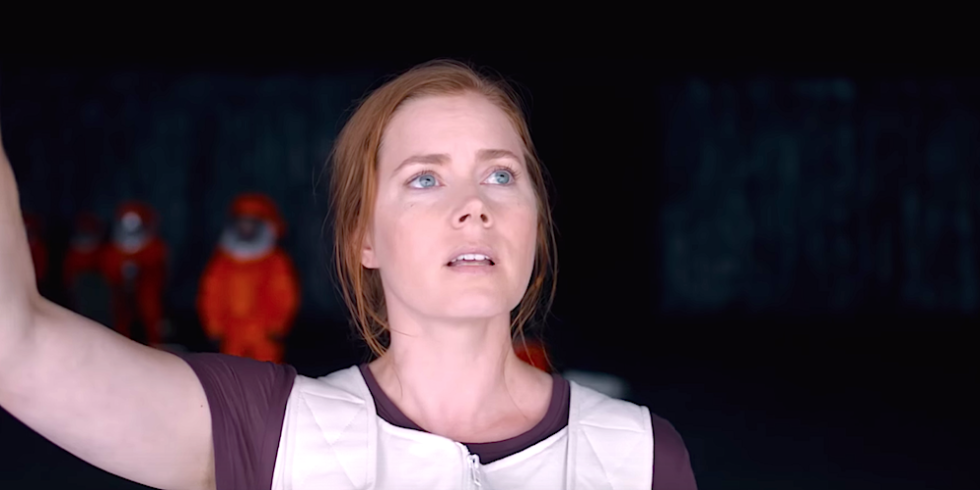
“Plenty of directors make violent movies. Denis Villeneuve makes movies about violence, which is not quite the same thing,” writes A.O. Scott in a review of last year’s Sicario. That film followed Emily Blunt as an idealistic FBI agent enlisted in an off-the-record task force fighting cartels. Another Villeneuve film, Prisoners, featured Hugh Jackman as a blue-collar father seeking vigilante justice for his children’s kidnappers. In both, characters decide to draw their own morality lines, using their better judgment and a perceived “greater good” as barometers for action. In Sicario, we see the effect of this thinking in institutions whereas in Prisoners it’s in the familial unit. Villeneuve’s latest, Arrival, also deals with violence, the threat of it more than its occurrence. Twelve egg-shaped spaceships come to earth, and global crisis ensues. One lands in Montana and a decorated linguist (Amy Adams) is flown in to try and communicate with the aliens on board. The military people surrounding the operation want to evaluate the threat and deal with it – their language is violent – so when the aliens tell Adams, opaquely, to “Use Weapon,” they freak. The stage is set for this threat of violence to be combatted with violence.
 On the topic of violence, not necessarily violent acts in and of themselves, but their accompanying traumas, Villeneuve’s films start with a pretty basic thesis: violence begets violence. Even if you set out with a noble goal, to shut down a cartel and keep drugs from crossing the border, say, or save your children’s lives, or save humanity from an alien threat, you may find yourself no different from your enemy. No different, and, in fact, maybe even worse. Benicio Del Toro is more violent in Sicario than the leader of the cartel, same with Hugh Jackman as he tortures Paul Dano in Prisoners. Villeneuve’s theme points to a truth of the gospel that has been extra pertinent in the wake of the election. As Nadia Bolz-Weber put it in her book Pastrix, “Every time we draw a line between us and others, Jesus is always on the other side of it.” There’s a problem with telling ourselves stories of human perfectibility and assuming that it’s in our power to change others. When we respond to a problem by immediately trying to fix it, we almost always make matters worse. This is a familiar narrative pattern: something inexplicable happens, people feel threatened by what they do not know, and they respond with violence (E.T., Stranger Things, the gospel).
On the topic of violence, not necessarily violent acts in and of themselves, but their accompanying traumas, Villeneuve’s films start with a pretty basic thesis: violence begets violence. Even if you set out with a noble goal, to shut down a cartel and keep drugs from crossing the border, say, or save your children’s lives, or save humanity from an alien threat, you may find yourself no different from your enemy. No different, and, in fact, maybe even worse. Benicio Del Toro is more violent in Sicario than the leader of the cartel, same with Hugh Jackman as he tortures Paul Dano in Prisoners. Villeneuve’s theme points to a truth of the gospel that has been extra pertinent in the wake of the election. As Nadia Bolz-Weber put it in her book Pastrix, “Every time we draw a line between us and others, Jesus is always on the other side of it.” There’s a problem with telling ourselves stories of human perfectibility and assuming that it’s in our power to change others. When we respond to a problem by immediately trying to fix it, we almost always make matters worse. This is a familiar narrative pattern: something inexplicable happens, people feel threatened by what they do not know, and they respond with violence (E.T., Stranger Things, the gospel).
In Arrival, Amy Adams’ character works against this human tendency and tries to listen to the visitors. The tremendous grace of her performance trumps the rather shallow political message of the movie – that if we could just communicate better, global policy issues would be worked out and crises would be averted. In a few pivotal moments, she reaches out and makes herself vulnerable in order to connect with others. She walks without a protective suit or weapon into the alien sanctum. She consorts with the Chinese president on a private line,, a seeming faux pas. She bucks the status quo and responds to an apparent threat with openness and an itch to hear both sides of the story.

In a self-interview published in The Paris Review, Walker Percy delves into this problem of our drawing lines in judgment of others and the violence that that can lead to. He directs the biblical truths of original sin and the sanctity of human life towards the influence of ideology on scientific inquiry – that secular, “free” science is usually not in fact free:
It is the widespread and ongoing devaluation of human life in the Western world—under various sentimental disguises: “quality of life,” “pointless suffering,” “termination of life without meaning,” et cetera. I trace it to a certain mind-set in the biological and social sciences which is extraordinarily influential among educated folk—so much so that it has almost achieved the status of a quasi-religious orthodoxy. If I had to give it a name, it would be something like: The Holy Office of the Secular Inquisition. It is not to be confused with “secular humanism” because, for one thing, it is antihuman. Although it drapes itself in the mantle of the scientific method and free scientific inquiry, it is neither free nor scientific. Indeed it relies on certain hidden dogma where dogma has no place. I can think of two holy commandments that the Secular Inquisition lays down for all scientists and believers. The first: In your investigations and theories, Thou shalt not find anything unique about the human animal even if the evidence points to such uniqueness. Example: Despite heroic attempts to teach sign language to other animals, the evidence is that even the cleverest chimpanzee has never spontaneously named a single object or uttered a single sentence. Yet dogma requires that, despite traditional belief in the soul or the mind, and the work of more recent workers like Peirce and Langer in man’s unique symbolizing capacity, Homo sapiens sapiens be declared to be not qualitatively different from other animals. Another dogma: Thou shalt not suggest that there is a unique and fatal flaw in Homo sapiens sapiens or indeed any perverse trait that cannot be laid to the influence of Western civilization.
 Directing this wisdom toward the election: when the confidence we had in our superior judgment proves to be a theology of glory, acknowledging a shared brokenness is crucial. Because our tendency is always to put our own ideologies and pre-conceived notions to bear on a situation, any ‘absolute standard’ based in ourselves falls flat. Villeneuve’s movies critique American diplomacy, often presenting a patriarchal, presumptuous machine that thinks it knows better (a fairly common Hollywood agenda). Yet in Arrival, the director’s protagonist resists drawing prohibitive lines and judging others. Amy Adams’ character repeatedly shows an appreciation and dedication for individual human life. To avoid spoilers I’ll remain vague here, but this thinking even pervades the excruciating decision she makes in regards to her family – one that may show unconditional love and profound maturity, or a selfish desire for a transient connection. You be the judge.
Directing this wisdom toward the election: when the confidence we had in our superior judgment proves to be a theology of glory, acknowledging a shared brokenness is crucial. Because our tendency is always to put our own ideologies and pre-conceived notions to bear on a situation, any ‘absolute standard’ based in ourselves falls flat. Villeneuve’s movies critique American diplomacy, often presenting a patriarchal, presumptuous machine that thinks it knows better (a fairly common Hollywood agenda). Yet in Arrival, the director’s protagonist resists drawing prohibitive lines and judging others. Amy Adams’ character repeatedly shows an appreciation and dedication for individual human life. To avoid spoilers I’ll remain vague here, but this thinking even pervades the excruciating decision she makes in regards to her family – one that may show unconditional love and profound maturity, or a selfish desire for a transient connection. You be the judge.
Should you go see it? Well, if you like movies and you like to think and be spoken to by them, then you should. Thinking about PZ’s post, this movie might have personal connection points for you. Adams deals with love and loss, and her memories are delivered in a Malick-esque dreamscape – the type of thing that stimulates reflection. Or, if you’re simply looking for a break from the blockbuster malaise, A.O. Scott humorously characterized Arrival this way: “It’s a movie, rather than a franchise installment or a piece of platform-agnostic digital entertainment.” Ain’t that a breath of fresh air? Reason enough for the grumpy Scott to applaud, and a nice night at the movies for the rest of us.

COMMENTS
3 responses to “Arrival and the Problem with Drawing Lines”
Leave a Reply













Great review David!